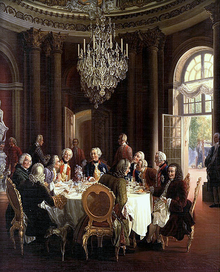"Le mouvement, qui est son état naturel" — Saint-Lambert
AM | @HDI1780
For decades, economists have debated the sources of Joseph A. Schumpeter's ideas on innovation, entrepreneurship and leadership. Recent contributions include those of Yuichi Shionoya, Erich Streissler and Nicholas Balabkins. In my view, the results are not very impressive. To the best of my knowledge, no one has paid attention to the works of the Encyclopedists, Helvétius and Condorcet as key sources of Schumpeter (*). We know, from various references in History of Economic Analysis, that the Austrian economist was familiar with their work. In fact, as I briefly explain in my book, it was precisely from Radical Enlightenment philosophers that Schumpeter took most of his rhetoric —and some of his most important ideas— on innovation and entrepreneurship.
* * *
Let me start with one of Schumpeter's key concepts: the idea of new combinations. According to Jan Fagerberg [see]:
Schumpeter added a definition of innovation (or development as he initially phrased it) as new combinations of new or existing knowledge, resources, equipment and so on (Schumpeter 1934, pp. 65) [...] Thus, for Schumpeter innovations are novel combinations of knowledge, resources etc. This combinatory activity he labeled the entrepreneurial function. For Schumpeter, these are key to innovation and long-run economic change.
Note that Saint-Lambert and Helvétius both used the term in the context of the so-called homme de génie, invention and "découverte". In De l'esprit (1758), a work repeatedly mentioned by Schumpeter, we read: "...chaque nouvelle combinaison a produit une nouvelle erreur ... Il en est d’autres que nous devons au génie : et, par ce mot de découverte, on doit alors entendre une nouvelle combinaison, un rapport nouveau apperçu entre certains objets ou certaines idées" (i.4 and iv.1). And here's Saint-Lambert in article GÉNIE:
...son enthousiasme augmente au spectacle de ses créations, c'est-à-dire, de ses nouvelles combinaisons, seules créations de l'homme. Emporté par la foule de ses pensées, livré à la facilité de les combiner, forcé de produire ... Dans les arts, dans les sciences, dans les affaires, le génie semble changer la nature des choses; son caractère se répand dans tout ce qu'il touche; il devance son siècle qui ne peut le suivre.
Tomorrow: Guillaume-Thomas Raynal on "nouvelles combinaisons" and the power of habit.
(*) See, in Histoire des deux Indes, the reference to "l’ordre constant qui pourvoit à la régénération par la destruction même" (x.5) and the post on Condorcet, credit and innovation.
_______________

No comments:
Post a Comment